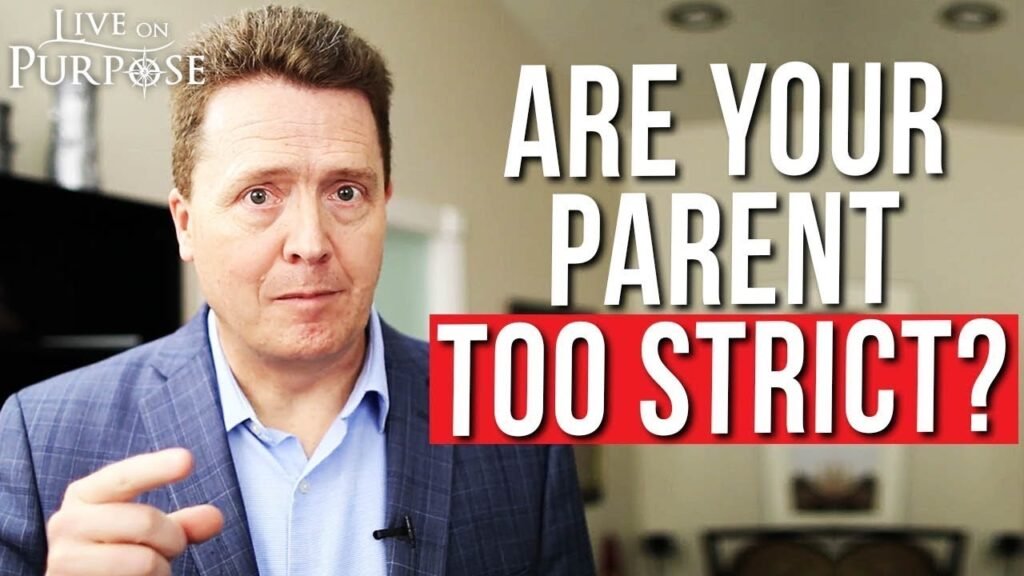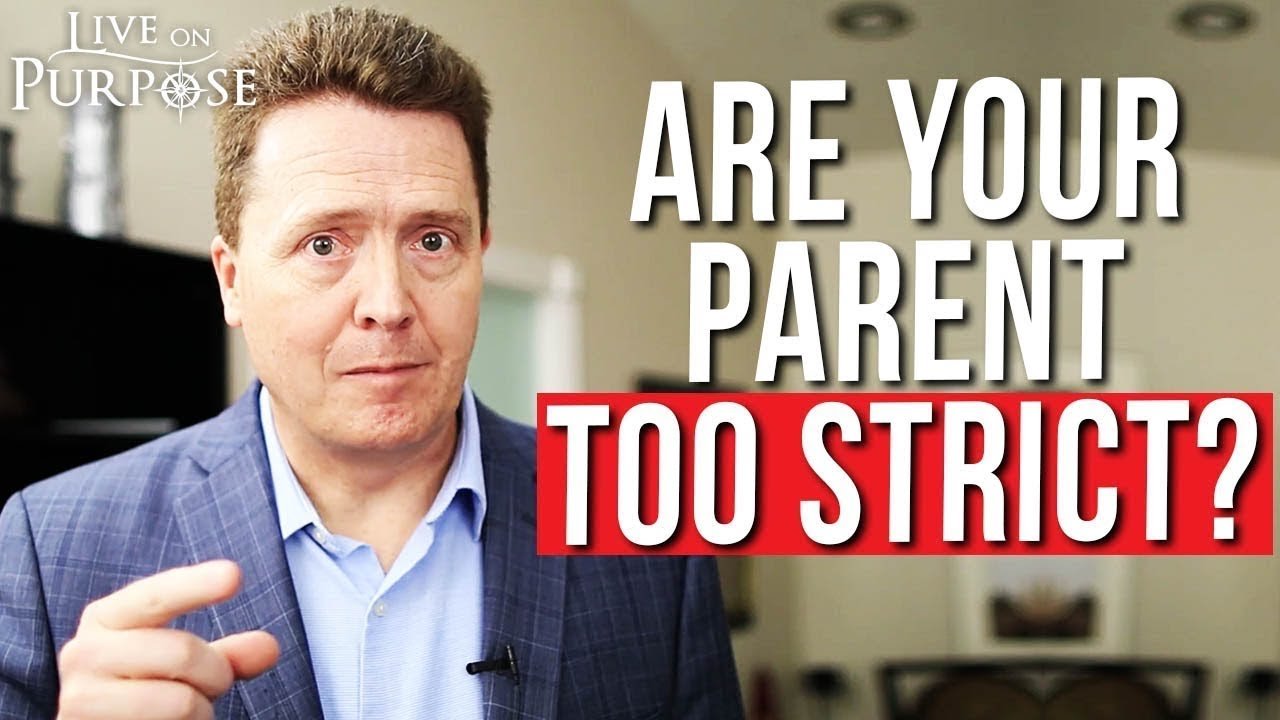Have you ever found yourself wondering why your parents are so overprotective? Well, in this video, Dr. Paul Jenkins provides some insight into the perspective of overprotective parents. With his own experiences as a parent and working with parents, Dr. Jenkins uses a metaphor of climbing a mountain to explain why parents may be so concerned for their children’s safety and feel the need to control their actions. He introduces the concept of stages of maturity and control, highlighting how parents’ perception of their children’s maturity affects their level of protectiveness. Dr. Jenkins also offers advice for addressing overprotectiveness by striving to be more mature and taking responsibility. So if you’re looking to better understand why your parents are the way they are, this video is definitely worth checking out!

Understanding overprotective parents
As a young person, you may often find yourself wondering, “Why are my parents so overprotective?” It can be frustrating when you feel like you’re not being given the freedom and independence you desire. But have you ever taken a moment to try and understand why your parents act the way they do? In this article, we will explore the psychology behind overprotective parents and dive into the metaphor of climbing a mountain to shed light on their perspective.
Connecting personal experience with working with parents
To truly understand overprotective parents, it helps to connect personal experiences with working with parents. The speaker in the video mentioned has firsthand experience both as a parent and with working alongside parents. By sharing his insights, we can gain a deeper understanding of their behavior and motivations.
Using the metaphor of climbing a mountain
To make this discussion more relatable, the speaker uses a metaphor of climbing a mountain. He invites us to visualize ourselves and our parents as hikers on a journey. The higher we climb, the better the view becomes. This metaphor illustrates the difference in perspective between parents and their children and sets the stage for further exploration.
The concern for children’s safety
One of the main reasons parents tend to be overprotective is their deep concern for their children’s safety. They want what is best for us and worry about the potential dangers and risks we may encounter. This worry stems from a place of love and genuine care, even if it may feel suffocating at times.
Understanding parents’ worry and overprotectiveness
Parents constantly face the fear that their children may be in danger. Whether it’s physical harm, emotional turmoil, or other risks, they want to shield us from anything that could potentially harm us. This worry can easily translate into overprotectiveness, as they try to minimize the perceived risks by exerting control over our actions and decisions.
Thinking their children are in danger
Parents often have an exaggerated perception of the dangers and risks their children face. This perception may be skewed due to their own life experiences, media influences, or even the nature of their profession. These factors can amplify their worry and lead to increased overprotectiveness. It’s important to remember that their intentions are rooted in keeping us safe.
Desire for control
Another factor that contributes to overprotectiveness is the parents’ need for control. They believe that by exerting control over their children’s actions, they can prevent any potential harm or negative outcomes. It gives them a sense of security and allows them to guide us towards what they believe is best for our future.
Parents’ need to control their children’s actions
Parents often feel a need to control their children’s actions, decisions, and overall life. This need stems from a desire to ensure that we make the right choices and avoid any pitfalls or mistakes. They may believe that by controlling our every move, they can protect us from the consequences of our actions.
Children having control over their own life
On the other hand, children also have their own need for control over their lives. This desire for autonomy and independence can clash with their parents’ need for control. It’s important to recognize that children have the right to make their own decisions and take responsibility for their own actions, as they navigate the journey of life.
Stages of maturity and control
To better understand the dynamics of control and maturity, we can break it down into different stages. The speaker introduces the concept of stages of maturity and control, which shed light on the evolving relationship between parents and children.
Introduction to the concept of stages of maturity and control
The concept of stages of maturity and control revolves around the idea that as individuals grow and develop, they gain increased control over their own lives. This progression happens in stages, and each stage is characterized by specific traits and behaviors.
Characteristics of stage 1: selfishness and demanding behavior
Stage 1 represents the early stages of maturity, where individuals may exhibit selfishness, demanding behavior, and a focus on their own wants and needs. At this stage, parents may feel the need to be more protective and controlling, as they perceive their children to be less capable of making sound decisions.
Characteristics of stage 2: cooperation and negotiation
Stage 2 is characterized by cooperation and negotiation. As individuals mature, they begin to understand the importance of working together and finding win-win solutions. At this stage, parents may start to relax their control and give their children more independence, recognizing their growing ability to handle certain situations.
Characteristics of stage 3: responsibility, morals, values, and empathy
Stage 3 represents the highest level of maturity and control. Individuals at this stage demonstrate responsibility, have developed a strong sense of morals and values, and exhibit empathy towards others. Parents who perceive their children to be at this stage are likely to grant them a significant degree of autonomy and control over their own lives.
The relationship between maturity and control
It’s important to recognize that the more mature a person is, the more control they have over their own life. This not only applies to the individual’s personal choices but also influences how parents perceive their children’s level of maturity and subsequently their level of overprotectiveness or control.
Understanding that the more mature a person is, the more control they have over their life
As individuals grow and mature, they become more capable of making informed decisions and taking responsibility for their actions. This increased maturity naturally leads to a higher level of control over their own lives. Parents who recognize this developmental progression are more likely to give their children the freedom they need to navigate the world.
Parents’ perception of their children’s maturity affecting their level of protection or control
Parents’ perception of their children’s level of maturity significantly affects their level of overprotectiveness. If parents view their children as being in a stage characterized by selfishness or demanding behavior, they are more likely to be protective and exert more control. Conversely, if parents perceive their children to demonstrate responsibility, morals, and empathy, they will be more inclined to grant them greater independence.
Addressing overprotectiveness
To address overprotectiveness, it is essential for children to strive for maturity and take responsibility for their lives. By demonstrating responsibility and fulfilling their obligations, children can alleviate their parents’ concerns and show that they are capable of handling themselves in various situations.
Striving for maturity through taking responsibility
One effective way to address overprotectiveness is by striving for maturity through taking responsibility. This involves actively seeking opportunities to demonstrate responsibility in daily life, such as completing chores, managing time effectively, and making wise decisions. By consistently exhibiting maturity and responsibility, children can gradually gain their parents’ trust and reduce their overprotectiveness.
Fulfilling obligations to alleviate parents’ concerns
Parents’ concerns are often rooted in a genuine desire for the well-being and safety of their children. By fulfilling obligations, meeting parental expectations, and displaying a sense of reliability, children can alleviate their parents’ concerns and further encourage them to give more autonomy and control. This can be achieved by consistently following through on commitments, demonstrating good decision-making skills, and maintaining open lines of communication.
Conclusion
Understanding why parents are overprotective is crucial for fostering a healthy relationship and gaining the freedom and independence we desire. By recognizing the concern for children’s safety, parents’ desire for control, and the influence of maturity on control, we can navigate the dynamics of parent-child relationships more effectively. By addressing overprotectiveness through striving for maturity and taking responsibility, children can create a sense of trust and mutual understanding with their parents, ultimately leading to a more balanced and fulfilling relationship.

